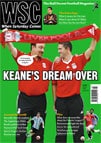 Phil Town describes the man voted as the world's best player
Phil Town describes the man voted as the world's best player
The Portuguese media were convinced pretty much across the board that Cristiano Ronaldo had his name on the FIFA Player of the Year award. Just for good measure though, sports daily A Bola felt a little push might help and organised an online petition, signed by 123,559 people, which was sent to each of the 207 football associations of the voting countries. “Cristiano Ronaldo in Zürich to be crowned the best in the world,” chanced the same paper on the day of the ceremony.
Sure enough, that night came the announcement of the inevitable from the rheumy-eyed former Rei Pelé (“The New King is Ours” ran A Bola’s front page banner headline the next day). It was a little incongruous that this blushing, nervous young man (among all the dedications to his mother, his sisters, his friends, his team-mates, he forgot to mention his brother), normally so flamboyant on and off the pitch, seemed so humbled by the occasion and the award, but it was refreshing that he accepted it in Portuguese; Luís Figo, the only other Portuguese winner, in 2001 when at Real Madrid, had controversially used Spanish, most likely due to marketing pressure, although he has never admitted as much.
There was, of course, a lot of (sometimes tortuous) hyperbole gushing out of the press the day after. A second sports daily, O Jogo, pulled out all the stops: “This is the corollary of a unique season… as if the FIFA award were just the small step needed to put Cristiano Ronaldo on a level that Humanity has never before reached.” Elsewhere, every drop was being squeezed out of the triumph. “More votes than Messi and Torres put together!” boasted the other national sports paper, Record. Free newspaper Meia Hora reminded us that only two countries (Brazil and France) had won the award more times than Portugal, and that in the 18 editions to date, only Liberia (George Weah) had fewer registered players.
But in some newspaper columns and on discussion boards there were enough dissenting voices to take a bit of the shine off, dissent fuelled by Ronaldo’s indifferent second half of the year, however irrelevant this was to the actual voting. A football-loving work colleague admitted she was prouder at the prospect of Barack Obama choosing a Portuguese breed – Cão de Água – as the White House dog than of Ronaldo’s accolade.
On the night of the ceremony, Portugal’s equivalent of the BBC’s Question Time, Prós e Contras (For and Against) devoted a special edition to the star and set out to identify the things that have made him so successful. In what eventually became more of a Prós e Prós, the guests on the show, including politicians, psychologists and coaches, came up with a veritable litany of key elements: work, professionalism, dedication, determination, commitment, ambition, simplicity, humility, innate talent, and the sheer pleasure he derives from what he does.
Then unexpectedly, there was the man himself, on the phone from Manchester. “I’ve just got in and turned on the TV and I thought I’d call,” he told the delighted assembly. Ronaldo is not the best of speakers – his mangling of the Portuguese language is notorious – but he did raise a few laughs in what was becoming an overly earnest evening. The presenter suggested he had dropped his head in relief when he heard Pelé say his name. “No, I was just checking my flies,” he giggled. Asked if there had been champagne on the private jet (€1,240 per hour to hire, according to glossy magazine Lux) taking him back to Manchester, he was a little cryptic: “Yeah … everything.”
After a while he excused himself “because I’ve got to be up early for training” (work, professionalism etc) and we were back to the guests. CR’s first tutor at Sporting, Paulo Cardoso, described how the 11-year-old would cry every night for Madeira and his family, especially his mother Dona Dolores, but how his determination to succeed, even at that age, saw him through. In O Jogo, he told the kids of Portugal: “Be ambitious and fight for your dreams. Always believe, because everything’s possible in life.”
Within a day or two of the award the tabloid Correio da Manhã reminded us of the things that young Portuguese men and boys might really aspire to in Ronaldo’s life, apart from winning honours: “Mysterious blonde gets into Ronaldo’s Bentley” was the story.
From WSC 265 March 2009